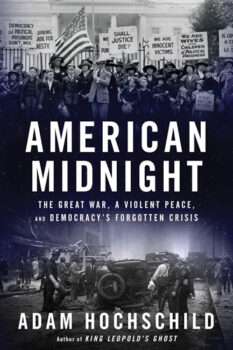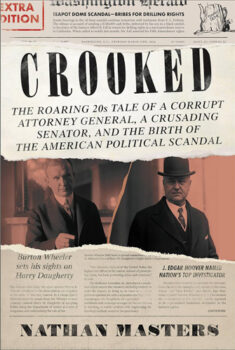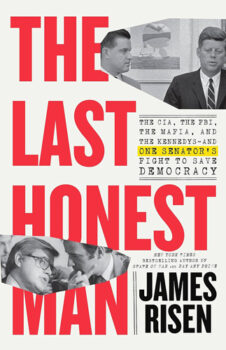Stranger Than Fiction
December 2023
Political Crimes
by Dean Jobb
The crackdown on free speech and political dissent that roiled America during and after World War One. President Warren Harding’s corrupt administration. And the maverick senator who worked tirelessly to expose the illegal operations of U.S. intelligence agencies. A look at recent books that expose crimes in high places.
“The world must be made safe for democracy,” President Woodrow Wilson famously declared in April 1917 as he urged Congress to plunge the United States into the carnage of the Great War. But siding with the Allies and declaring war on Germany ignited a second, internal war—a battle for the soul of America that would crush the constitutional rights of thousands of citizens, from union leaders, socialists and conscientious objectors to recent immigrants and members of minority groups. Patriotic zeal and racial, class, and political tensions led to “mass imprisonments, torture, vigilante violence, censorship, killings of Black Americans,” notes the eminent historian Adam Hochschild. “A war supposedly fought to make the world safe for democracy became the excuse for a war against democracy at home.”
 In American Midnight: The Great War, a Violent Peace, and Democracy’s Forgotten Crisis (Mariner Books), Hochschild recreates the tense, violent years between 1917 and 1920, when the U.S. government ruthlessly cracked down on anyone who criticized how the war was being waged or the businesses profiting from the slaughter on Europe’s battlefields. Men whose only offence was to join a union or balk at buying war bonds were beaten, whipped, or tarred and feathered. Pacifists who refused to fight were tortured in prison. Nooses were mailed to Senator Robert La Follette of Wisconsin, one of the few congressmen brave enough to publicly oppose the war. Suspected Bolshevik sympathizers were rounded up in raids worthy of the most despotic police state. Newspapers and magazines that refused to toe the line were censored or forced out of business. The Constitution’s cherished protections of free speech and civil liberties applied only to those who supported the war.
In American Midnight: The Great War, a Violent Peace, and Democracy’s Forgotten Crisis (Mariner Books), Hochschild recreates the tense, violent years between 1917 and 1920, when the U.S. government ruthlessly cracked down on anyone who criticized how the war was being waged or the businesses profiting from the slaughter on Europe’s battlefields. Men whose only offence was to join a union or balk at buying war bonds were beaten, whipped, or tarred and feathered. Pacifists who refused to fight were tortured in prison. Nooses were mailed to Senator Robert La Follette of Wisconsin, one of the few congressmen brave enough to publicly oppose the war. Suspected Bolshevik sympathizers were rounded up in raids worthy of the most despotic police state. Newspapers and magazines that refused to toe the line were censored or forced out of business. The Constitution’s cherished protections of free speech and civil liberties applied only to those who supported the war.
The author offers vivid portraits of the villains and heroes of the era. Postmaster General Albert Burleson was a Southern racist who ruthlessly suppressed publications critical not only of the war effort, but of the powers that be. The charismatic Emma Goldman, an avowed anarchist, was imprisoned for opposing the draft and met face-to-face with J. Edgar Hoover, the Justice Department official who coordinated the Red Scare raids and deported her to Russia. Louis F. Post, as acting secretary of labor, refused to deport suspected communists based on flimsy evidence and trumped-up charges. President Wilson’s quixotic postwar battle to establish the League of Nations and prevent future wars is tarnished by the ugly, racist attitudes he spouted before and after reaching the White House. His predecessor, Theodore Roosevelt, is exposed as a bullying warmonger who condemned those who opposed the war as “professional pacifists, poltroons, and college sissies.”
Hochschild, whose previous books have tackled the slave trade and Belgium’s atrocities in The Congo, turns his sights on a bleak time most Americans would prefer to forget—but one that, arguably, is more urgent than ever to remember. The author draws constant, troubling parallels to today’s unrelenting attacks on minorities, immigrants, constitutional rights, and democracy itself. This is a must-read with warnings and lessons for our tumultuous times. During Donald Trump’s presidency, he writes, “the forces that had blighted the America of a century earlier would be dramatically visible yet again: rage against immigrants and refugees, racism, Red-baiting, fear of subversive ideas in schools.” Courageous government officials like Louis Post, a strong, independent news media, and “a vigilant respect for civil rights and constitutional safeguards” are essential, he adds, “to save ourselves from ever slipping back into the darkness again.”
Wilson, by one account, feared that the war would make Americans more intolerant and inject a “spirit of ruthless brutality . . . into the very fibre of our national life.” As Hochschild shows, his prediction, sadly, was correct.
 American Midnight ends in 1920, the year Republican Warren Harding won the presidency. Harding swept into office with a promise to end the turmoil of the wartime and postwar years and return America to “normalcy.” What he delivered, however, was villainy—the Teapot Dome oil-leases scandal and graft, bribery, kickbacks, and obstruction of justice on a massive scale. Among the chief architects of one of the most corrupt administrations in America’s history was the backroom schemer who put Harding and his “Ohio gang” in the White House and served as his attorney general: Henry Daugherty.
American Midnight ends in 1920, the year Republican Warren Harding won the presidency. Harding swept into office with a promise to end the turmoil of the wartime and postwar years and return America to “normalcy.” What he delivered, however, was villainy—the Teapot Dome oil-leases scandal and graft, bribery, kickbacks, and obstruction of justice on a massive scale. Among the chief architects of one of the most corrupt administrations in America’s history was the backroom schemer who put Harding and his “Ohio gang” in the White House and served as his attorney general: Henry Daugherty.
Librarian and author Nathan Masters chronicles how Daugherty transformed the Department of Justice into an agency of injustice in Crooked: The Roaring ’20s Tale of a Corrupt Attorney General, a Crusading Senator, and the Birth of the American Political Scandal (Hachette Books). Daugherty protected bootleggers and other crooks who had enough money to buy their freedom and used the detectives in his department’s Bureau of Investigation—the forerunner of the FBI—as a force of secret police, deploying them to dig up dirt on his political enemies.
In this impressive debut, Masters focuses on Daugherty’s battle with his nemesis, rookie Senator Burton Wheeler, a Montana progressive and former federal prosecutor determined to clean up Washington (he inspired the naive and incorruptible character Jimmy Stewart portrayed in Mr. Smith Goes to Washington). A convenient suicide, reluctant witnesses, shadowy political operatives, a smarmy double agent, and unscrupulous detectives give Masters the raw material he needs to craft a gripping narrative that zips along like one of the era’s express trains.
The public showdown between these proxies for Good and Evil, Masters asserts, “would profoundly reshape the Justice Department, the Bureau of Investigation, and even the Senate—and forever change the way political scandal played out across America.” While this may sound like an exaggeration, the author shows how Wheeler’s relentless attacks drove Daugherty from office, ushered in reforms, and catapulted Hoover into the top job at the Bureau of Investigation—a move that would lead to new forms of domestic surveillance and abuse of power. And Crooked shows how the fallout from the Wheeler-Daugherty battle gave the Senate wider powers to expose government wrongdoing and hold bureaucrats and elected officials accountable.
“Wheeler’s particular genius,” Masters writes, “was to seek justice . . . in the court of public opinion.” Daugherty was never convicted of the many crimes he committed or sanctioned, but Wheeler’s Senate hearings “consigned America’s most corrupt attorney general to the judgment of history.” And Masters’s particular genius for character- and action-driven storytelling breathes life into a century-old political scandal that resonates today.
 Fast-forward a half-century. One of Wheeler’s successors in the role of dogged Senate investigator was Frank Church, who would use the powers and headline-grabbing public hearings that Wheeler pioneered to expose the clandestine operations of America’s shadowy alphabet soup of intelligence agencies—the CIA, the FBA, the NSA and others.
Fast-forward a half-century. One of Wheeler’s successors in the role of dogged Senate investigator was Frank Church, who would use the powers and headline-grabbing public hearings that Wheeler pioneered to expose the clandestine operations of America’s shadowy alphabet soup of intelligence agencies—the CIA, the FBA, the NSA and others.
Church was born in the mid-1920s—about the time Wheeler was taking on Daugherty—in Utah, then “one of the most isolated places in an isolationist America,” notes two-time Pulitzer Prize-winning investigative journalist James Risen. Back then, the U.S. had “few international commitments and no significant, permanent national security establishment.” By 1975, the year Church began airing the spy services’ dirty linen, agents working for the U.S. had plotted assassinations, triggered coups, and meddled in the internal affairs of numerous foreign countries, all in the name of protecting or advancing America’s interests.
Risen tells Church’s story in The Last Honest Man: The CIA, the FBI, the Mafia, and the Kennedys—and One Senator’s Fight to Save Democracy (Little, Brown and Company), an impressively researched, well-told tale of one man’s fight to bring the spies in from the cold. Church, he writes, “is responsible for bringing the CIA, the FBI, the NSA, and the rest of the government’s intelligence apparatus under the rule of law for the first time.”
Just thirty-two when he was elected to the Senate, Church befriended fellow Democrat and senator John F. Kennedy and broke with Kennedy’s successor as president, Lyndon Johnson, over Vietnam. He became an early congressional critic of the war and Risen shows how Church’s antiwar stance morphed into a deeper disillusionment with American interventions to shore up or topple regimes in other countries from Iran to Chile.
In the reckoning over government abuses of power that followed the Watergate scandal, he was the logical choice to chair the Select Committee to Study Governmental Operations with Respect to Intelligence Activities, which became known as the Church Committee. The committee’s revelations—including domestic surveillance of Martin Luther King, Jr. and other civil-rights leaders and Jason Bourne-style plots to assassinate foreign dictators seen as threats to American interests—culminated in the Foreign Intelligence Surveillance Act of 1978, which subjected the CIA and other agencies to civilian oversight.
Risen conducted hundreds of interviews and unearthed newly declassified records to document one man’s determination to check the power of covert agencies, and draws on a trove of interviews conducted with Church before he died in 1984. The 9/11 attacks, Risen notes, have heightened calls for more oversight of the operations of the intelligence agencies on the front lines of the War on Terror. “The Church Committee has now achieved a permanent place in the American political lexicon,” with its name still invoked “whenever there is a new public outcry for accountability for deep governmental misdeeds.”
Church had presidential ambitions but, despite his high-profile crusade against the overreach of intelligence agencies, the stars never aligned for a White House bid—he dropped out of the race for the 1976 Democratic nomination, which went to Jimmy Carter. One of Church’s most lasting legacies, however, is a simple act of kindness that changed history. When a newly elected Democratic senator lost his wife and daughter in a tragic car crash in 1972, he was among those who convinced his bereaved colleague—who was about to resign—to soldier on. He did. His name is Joseph R. Biden, Jr., who’s now serving as the forty-sixth president of the United States.
———
Award-winning true crime author Dean Jobb’s new book, A Gentleman and a Thief: The Daring Jewel Heists of a Jazz Age Rogue (Algonquin Books), will be released in June 2024. It’s the story of Arthur Barry, who charmed the elite of 1920s New York while planning some of the most brazen jewel thefts in history. Find him at www.deanjobb.com.
Copyright © 2023 Dean Jobb
